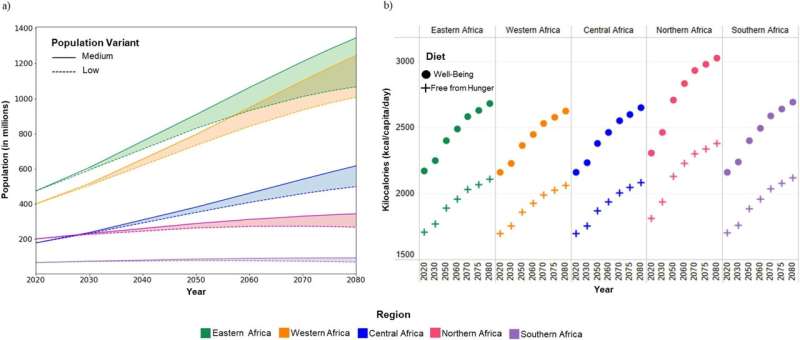Africa has one of the world's fastest population growth rates. Growth models project the continent's current population of about 1.3 billion people will nearly double to 2.5 billion by 2050—and it's likely to keep growing beyond that.
At the same time, malnutrition is widespread in Africa—21% of the population faces food insecurity—and the continent is especially vulnerable to climate change. Warmer regions are already experiencing desertification, and areas of low agricultural productivity are susceptible to climate shocks from adverse weather, drought, flooding, and erratic rainfall. The combined effects of population growth and climate change raise a serious question for the continent: How will Africa feed its growing populace in increasingly unfriendly conditions?
In a study published in Earth's Future, Beltran-Peña and D'Odorico applied the results from agrohydrological, climate, and socioeconomic models to assess food self-sufficiency and climate vulnerability for 49 African countries under a scenario in which the global average temperature is 3°C above preindustrial levels by later this century. They found that under a 3°C warmer climate, Africa will face a severe mismatch between population size and food autonomy. By 2075, food production in Africa will be able to feed only 1.35 billion out of an estimated 3.5 billion people—a finding that already accounts for increased agricultural productivity through improved irrigation and sustainable practices.
Under this climate scenario, African nations will have to expand cropland and rely more heavily on food imports. Both approaches come with downsides: Cropland expansion carries potentially disastrous ecological ramifications, whereas reliance on imports would make Africa more susceptible to volatility in global food prices. The analysis indicated that eastern and western Africa will have the most significant import needs.
The research also suggested steps to address the grim forecast. Increasing the proportion of plant-based foods consumed and improving water storage—particularly in arid regions—can help mitigate growing food insecurity, for example. In addition, halving current food loss and waste rates could bolster domestic food production and feed an additional 130 million people. Nevertheless, the researchers note, these solutions will not eliminate projected food deficits on the continent.
The second of the United Nations' Sustainable Development Goals is to end hunger and malnutrition. This research suggests this goal may not be feasible in Africa under the current emissions and warming paradigm.





Recommended Comments
There are no comments to display.
Join the conversation
You can post now and register later. If you have an account, sign in now to post with your account.
Note: Your post will require moderator approval before it will be visible.